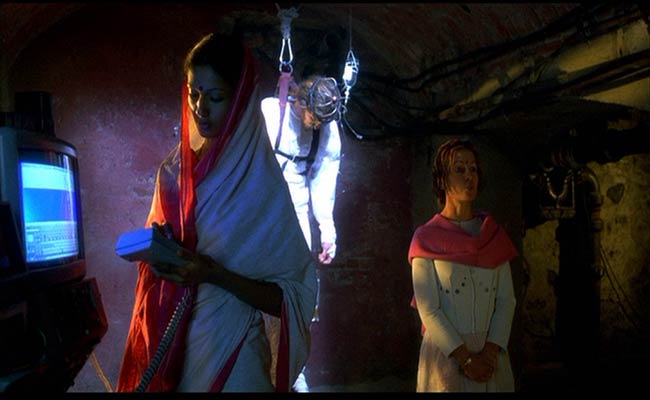February 20, 2007
Beware Techophobes - Be Assimilated or Go to Jail!
In a a few short decades, we’ve gone from a normal industrialized society that supported people of all technology comforts to a society where people in the most essential of societal jobs need to be fluent in computers just to stay out of jail. Urshanabi brings us this article in the Techy News Picks of the Day thread where Julie Amero, a substitute teacher from the backwards-ass town of Norwich, Connecticut was convicted, and could be sentenced for up to 40 years for the misfortune of having spamware on her classroom computer. I say backwards-ass because any town that could find 12 jurors that would blame this action on a technophobe are as computer illiterate as Julie Amero. The story is as follows:
Julie Amero was convicted of four counts of ‘risking injury to a child’ and will face up to forty years in prison when she is sentenced in March. The conviction was handed down in the Norwich Superior Court. The story behind this and the facts used to convict her have many in the IT world gaping in shock.
The story behind the case starts in 2004. Amero was using a computer in a seventh grade class to email her husband. Before she sent the email, she left to use the restroom and came back into the classroom, finding students watching a hairstyle ad on the PC. This is where the trouble starts. Attempting to close the pop-up ad for the hairstyle promotion she was suddenly bombarded with an endless stream of pop-up ads for pornography related services and websites.
The computer and the pop-up ads continued to run all day long according to court reports and news interviews. Amero, a self-described ‘technophobe’ (someone who is afraid of or does not know how to use current technology) did not attempt to turn off the computer, or unplug it for two reasons. The first, she claims was because she did not know how to turn off the computer. The second is she was trained never to touch anything in another teacher’s classroom. She had only asked to send and email, and in her opinion, disabling the computer or unplugging it would have not been within the scope of what she was allowed to do.
She attempted to seek help, leaving the classroom to head to the teachers lounge. Later, because she failed to close and lock the classroom when she went to the lounge, this was added as proof of her irresponsible actions. In all, four children were exposed to the ads and images. During the trial, it was suggested that she spent too much time looking at the internet and that she intentionally surfed pornographic websites. If she is a ‘technophobe’ as claimed, it is likely sending email, is the only thing she knows how to do on a computer. Anything else and she would shy away from it. Her husband also confirmed that she is a ‘technophobe’ both at trial and in interviews.
The implications to society from this case are clear - technophobes are not only being left behind, they’re now considered to be criminally negligible. Academic skills such as a degree in education are now secondary to information proficiency. Forget figuring out how to program your VCR, if you don’t know the basics of computer pitfalls, your competence as a professional is shot. Even some letters to the local backwards-ass newspaper, the Norwich Bulletin, back this sentiment up.
If Amero had better competency, she would have unplugged the computer or covered it up until someone who knew how to remove the pop-ups could solve the problem.
If the school district and principal knew how to use the technology, they would have stood by their teacher.
The solution here is simple. Dismiss the criminal counts. Fire Amero from her job for her incompetent handling of the situation.
Julie Amero’s beleaguered husband describes this situation in 1984 terms:
Welcome to 2004
George Orwell was a little off, but not by much. Technology has engulfed the average American at an alarming rate. To think that it is possible for the average layperson to understand all the ins and outs of how a computer works is just not reasonable. What’s worse, our employer’s don’t know any more than we do, and they rely on us to identify problems when they happen. If you are lucky, your employer will know what to do when a crisis happens with your system. If not you’ll end up like Julie arrested, ridiculed, demeaned and left with useless teacher’s degree in special education.
We can all mock Julie for being afraid to turn off the computer because she was “never told” she was allowed to do this, but most of us who have worked with technophobes know the drill - technophobes take as few actions as possible with the computer for fear of breaking something. When the inevitable breakdown occurs, their worst fears are realized and they tend to panic. We see this when new versions of office applications come out - technophobes fumble around trying to figure out how to now do what they used to do in the last version, while computer literate folk seek out all the new features. Worse, we all see this as a generational issue - that older folk are in danger of becoming irrelevant while the younger generation intuitively adapts to the new technology. But is this really so? How will today’s 30 something do with technology coming out 20 years from now?
So what are we left with? Clearly the case against Julie Amero is horribly flawed and will probably be overturned on appeal once it leaves the confines of Luddite-land, CT. But the larger point remains - the level of competence in information proficiency that people need in order to succeed in today’s world is far greater than it was 10 years ago. We have become a networked society. Internet addiction is becoming the norm among a huge percentage of the population. And the trend is clear - in ten years from now, the amount of knowledge needed to survive will be significantly greater than today. Will the scam artists be gone then? What about the future equivalent of spyware? Where then will technophobes like Julie be? The schism in society between those who “get it” and those who are technologically clueless will only get worse.







